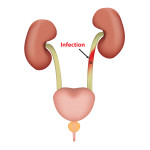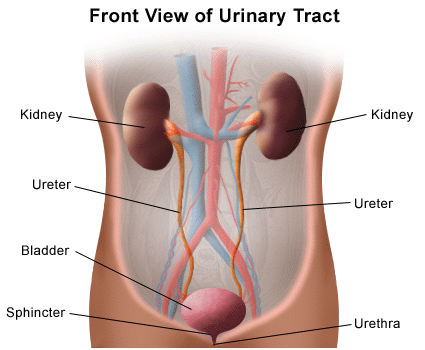 A urinary tract infection (or UTI) is an infection in the kidney, ureters, bladder, or urethra, usually caused by bacteria. Even though UTIs are much more common in young women than in young men, it’s important for you to know that almost anyone can get one. It’s also important to realize that sexually transmitted infections (STIs) can have similar symptoms as UTIs in guys. Read on to learn more about the urinary tract, the signs and symptoms a UTI, and how it’s treated.
A urinary tract infection (or UTI) is an infection in the kidney, ureters, bladder, or urethra, usually caused by bacteria. Even though UTIs are much more common in young women than in young men, it’s important for you to know that almost anyone can get one. It’s also important to realize that sexually transmitted infections (STIs) can have similar symptoms as UTIs in guys. Read on to learn more about the urinary tract, the signs and symptoms a UTI, and how it’s treated.
What is the urinary tract?
The urinary tract includes your kidneys, ureters, bladder, and urethra. The kidneys filter your blood, removing extra water and waste, and this process produces urine. This urine travels down from the kidneys to two tubes called ureters, and then gets stored in the bladder. When you urinate, the urine leaves the bladder through your urethra.

What is a urinary tract infection (UTI)?
A UTI is an infection of the urinary tract. Most often, an infection occurs because bacteria that live in the bowel get into your bladder or kidneys and multiply in your urine.
The 3 main types of UTIs are:
- Bladder infection (cystitis): The most common type of UTI.
- Infection in the urethra (urethritis): Urethritis occurs when an infection affects the urethra – the tube that delivers urine from your bladder to the outside of the body. Urethritis can be caused by a UTI or an STI.
- Kidney infection (pyelonephritis): A kidney infection occurs when bacteria from the bladder make their way into the kidneys. This is a more serious infection, and can cause a high fever, chills, back pain, and vomiting.
What are the most common symptoms of a UTI?
The most common symptoms of a UTI include:
- Urinating (peeing) more than usual
- Having an intense urge to urinate, even if nothing comes out
- Any kind of pain* or burning while urinating
- Urine that has a bad smell
- Fever or chills
- Nausea and vomiting
- Pain in the lower abdomen (belly)
*Pain or burning while urinating is also a symptom of an STI like chlamydia, gonorrhea, genital herpes, and trichomoniasis. If you’re experiencing this symptom, call your health care provider right away, and get tested.
What factors effect someone’s risk for getting a UTI?
Some people are more likely to get a urinary tract infection. Factors that increase a person’s risk include:
- Having sex often or with a new partner
- Having anal sex
- Not being circumcised
- Diabetes
- A recent bladder or kidney infection (within the past 12 months)
- Using spermicide to prevent pregnancy
What should I do if I think I have a UTI?
If you have any of the symptoms listed above, it’s important to call your health care provider (HCP) immediately and make an appointment. Don’t ignore your symptoms; they will likely get worse. If left untreated, a kidney infection can become serious and cause permanent damage to your kidneys.
How can my health care provider tell if I have a UTI?
Your health care provider will ask you about your symptoms and whether or not you’ve had a UTI in the past. Your HCP may also ask questions about your sexual history, including condom use, how many sexual partners you’ve had, and whether you’ve had anal intercourse. These questions are important because a guy can get an STI through sexual intercourse and the symptoms are similar.
You will also be asked to give a urine sample, as a UTI is usually diagnosed by a urine test that checks for bacteria in your pee. Your health care provider will ask you to pee into a cup. Your urine sample may be tested first with a “dipstick test” (a strip of paper that has been treated with a certain chemical that checks for white blood cells, protein, and glucose). The result of the dipstick test is available right away.
It is likely that your urine sample will also be sent to the lab for further testing. It usually takes about 1-3 days to get the results of the urine culture back. Your HCP will be able to tell if you have a UTI based on your symptoms and the result of the urine test. If you are sexually active, or your health care provider is concerned that your symptoms are from another cause, such as chlamydia, herpes or another STI, he or she will test you for STIs.
What is the treatment for a UTI?
If you have a UTI, your HCP will prescribe antibiotics to kill the bacteria that are causing the infection. You will likely have to take the antibiotics for 3-5 days (possibly longer), but the length of time can vary depending on how bad the infection is. It’s extremely important to take ALL of the medicine that your HCP has prescribed, even if you start feeling better. If you don’t finish the antibiotics, the infection could come back.
Your HCP may also recommend that you drink a lot of water and empty your bladder frequently while you have a UTI. This is important for helping your bladder clean itself and will cause you to pee more often.
If you have bladder spasms (cramping pain that comes and goes in the lower part of your abdomen), your HCP may prescribe medicine to help with the pain. Some medicines that help treat bladder spasms may turn your urine an orange color. This is a completely normal side effect and only lasts as long as you are taking the medicine.
Is there anything I can do to prevent getting a UTI?
It’s not easy to prevent getting a UTI, but there are some things you can do, including:
- Drinking a lot of water each day so that you keep your bladder working to cleanse itself.
- Urinate frequently: If you have to pee, don’t hold it in!
 Young Men's Health
Young Men's Health
